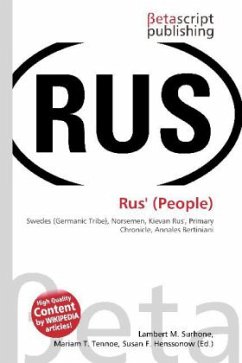
Rus' (People)
Versandkostenfrei!
Versandfertig in 6-10 Tagen
19,99 €
inkl. MwSt.

PAYBACK Punkte
10 °P sammeln!
Please note that the content of this book primarily consists of articles available from Wikipedia or other free sources online. The Rus'' (Ros, Rhos, from Swedish: Ros, Greek: ) were the historic population of the Rus'' Khaganate and Kievan Rus''. One of the earliest written sources mentioning the people called Rus in the form of Rhos dates back to year 839 AD in a Royal Frankish chronicle Annales Bertiniani, identified as a Germanic tribe called Swedes by the Frankish authorities. According to the Kievan Rus'' Primary Chronicle compiled in about 1113 AD, the Rus were a group of Varangians, No...
Please note that the content of this book primarily consists of articles available from Wikipedia or other free sources online. The Rus'' (Ros, Rhos, from Swedish: Ros, Greek: ) were the historic population of the Rus'' Khaganate and Kievan Rus''. One of the earliest written sources mentioning the people called Rus in the form of Rhos dates back to year 839 AD in a Royal Frankish chronicle Annales Bertiniani, identified as a Germanic tribe called Swedes by the Frankish authorities. According to the Kievan Rus'' Primary Chronicle compiled in about 1113 AD, the Rus were a group of Varangians, Norsemen, who had relocated from Scandinavia, first to Northeastern Europe, then to the south where they created the medieval Kievan state. Their name survives in the designation Rospigg, a person from Roslagen, and the cognates Russians, Rusyns, and Ruthenians, and who are viewed by the modern Belarusians, Russians, and Ukrainians as the predecessors of their own peoples. In Sweden, today Rospiggar are males living in the coastal region of the province of Uppland.












